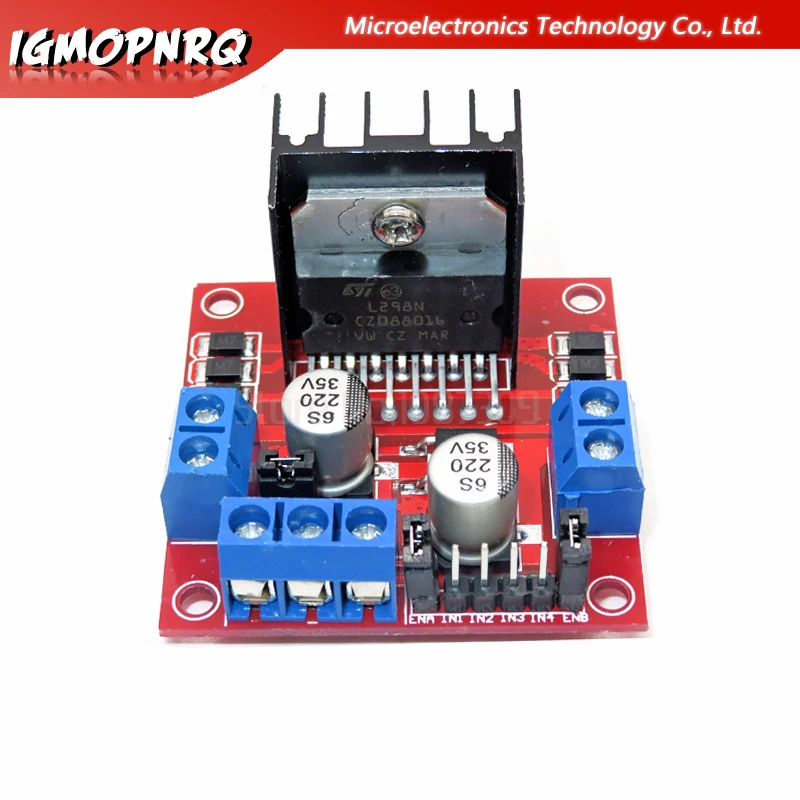Back to Step by Step Course by Robojax
Lesson 53: Using L298N Motor Driver for DC Motor Control | Arduino Step By Step Course
If you don't like to see ads while video is being played you can purchase YouTube premium Here
Lesson 53: Using L298N Motor Driver for DC Motor Control | Arduino Step By Step Course
Please select other codes for this lecture from the links below.
- Lesson 53-1: Using L298N Motor Driver to control single DC motor using Arduino
- Lesson 53-2: Using L298N Motor Driver to control two DC motors using Arduino
- Lesson 53-3: Using two L298N modules to control four DC motor using Arduino
Related or required files and link to this lesson
- Robojax L298N Library (zip file)
- Purchase L298N module from eBay (Affiliated)
- Purchase L298N relay from Amazon USA (Affiliated)
- Purchase Dual channel relay from Amazon Canada(Affiliated)
- Purchase L298N module from AliExpress (Affiliated)
- L298N Datasheet (pdf)
Part 5: DC Motors
In this lesson we learn how to contorl a DC motor using L298N Motor driver module and Arduino .
Please watch the video for full details.
This code controls two L298N Modules and as a result, we can control 4 motors. We have Module A (moduleA) and Module B (moduleB) and each module can control 2 motors motor1 and motor2.
- 00:00 Introduction
- 09:13 Wiring Explained
- 13;24 Code Explained
- 24:12 Wiring for parallel connection
- 27:38 Demonstration of parallel driver
 AliExpress.com Product - 1pcs L298N MOTOR DRIVER module New Dual H Bridge DC Stepper Motor Drive Controller Board Module
AliExpress.com Product - 1pcs L298N MOTOR DRIVER module New Dual H Bridge DC Stepper Motor Drive Controller Board Module
/*
Lesson 53: Using L298N Motor Driver for DC Motor Control
This code is to use Two L298N Modules to control 4 motors
Watch full detailed Video https://youtu.be/fqBLIrwq2YA
* Library Example for L298N Module to control DC motors
*
* This code is to control single motor_front. For two motor control, please open L298N_DC_2_Motors
P
*
* Written by Ahmad Shamshiri on October 01, 2019 at 21:26
* in Ajax, Ontario, Canada. www.robojax.com
*
*
*
If you found this tutorial helpful, please support me so I can continue creating
content like this. You can support me on Patreon http://robojax.com/L/?id=63
or make donation using PayPal https://bit.ly/donate-robojax
* * This code is "AS IS" without warranty or liability. Free to be used as long as you keep this note intact.*
* This code has been download from Robojax.com
This program is free software: you can redistribute it and/or modify
it under the terms of the GNU General Public License as published by
the Free Software Foundation, either version 3 of the License, or
(at your option) any later version.
This program is distributed in the hope that it will be useful,
but WITHOUT ANY WARRANTY; without even the implied warranty of
MERCHANTABILITY or FITNESS FOR A PARTICULAR PURPOSE. See the
GNU General Public License for more details.
You should have received a copy of the GNU General Public License
along with this program. If not, see <https://www.gnu.org/licenses/>.
*/
// motor 1 settings for module A
#define IN1_A 2
#define IN2_A 4
#define ENA_A 3 // this pin must be PWM enabled pin
// motor 2 settings for module A
#define IN3_A 7
#define IN4_A 8
#define ENB_A 9 // this pin must be PWM enabled pin
// motor 3 settings for module B
#define IN1_B 6
#define IN2_B 10
#define ENA_B 5 // this pin must be PWM enabled pin
// motor 4 settings for module B
#define IN3_B 12
#define IN4_B 13
#define ENB_B 11 // this pin must be PWM enabled pin
const int CCW = 2; // do not change
const int CW = 1; // do not change
#define motor1 1 // do not change as this is used by both ModuleA and moduleB
#define motor2 2 // do not change as this is used by both ModuleA and moduleB
// use the line to control module A (motor 1 and motor 2)
Robojax_L298N_DC_motor moduleA(IN1_A, IN2_A, ENA_A, IN2_A, IN3_A, ENB_A, true);
// use the line to contorl module B (motor 3 and mootor 4)
Robojax_L298N_DC_motor moduleB(IN1_B, IN2_B, ENA_B, IN2_B, IN3_B, ENB_B, true);
void setup() {
Serial.begin(115200);
moduleA.begin();
moduleB.begin();
//L298N DC Motor by Robojax.com
}
void loop() {
moduleA.demo(1);
moduleA.demo(2);
moduleA.rotate(motor1, 60, CW);//run motor1 of moduleA at 60% speed in CW direction
moduleB.rotate(motor2, 60, CCW);//run motor2 of moduleB at 60% speed in CCW direction
delay(3000);
moduleA.brake(1);
moduleB.brake(2);
delay(2000);
moduleA.rotate(motor1, 100, CW);//run motor1 of module A at 60% speed in CW direction
moduleA.rotate(motor2, 100, CCW);//run motor2 of module A at 60% speed in CCW direction
moduleB.rotate(motor1, 100, CW);//run motor1 of module A at 60% speed in CW direction
moduleB.rotate(motor2, 100, CCW);//run motor2 of module A at 60% speed in CCW direction
delay(3000);
moduleA.brake(1);
moduleA.brake(2);
moduleB.brake(1);
moduleB.brake(2);
delay(2000);
for(int i=0; i<=100; i++)
{
moduleA.rotate(motor1, i, CW);// turn motor1 with i% speed in CW direction (whatever is i)
delay(100);
}
delay(2000);
moduleA.brake(1);
moduleA.brake(2);
delay(2000);
moduleA.rotate(motor1, 70, CCW);//run motor1 at 70% speed in CCW direction
moduleA.rotate(motor2, 5, CW);//run motor2 at 50% speed in CW direction
delay(4000);
moduleA.brake(3);
delay(2000);
}
The least I expect from you is to thumb up the video and subscribe to my channel. I appriciate that. .I have spent months making these lectures and writing code. You don't lose anything by subscribging to my channel. Your subscription is stamp of approval to my videos and more people can find them and in it turn it helps me. Thank you
If you found this tutorial helpful, please support me so I can continue creating content like this. support me via PayPal 
**** AFFILIATE PROGRAM **** We are a participant in the Amazon Services LLC Associates Program, an affiliate advertising program designed to provide a means for us to earn fees by linking to Amazon.com and affiliated sites.